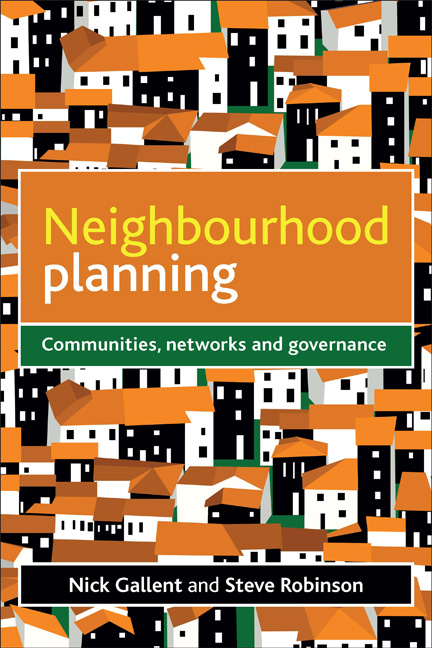Book contents
- Frontmatter
- Dedication
- Contents
- List of figures, images and table
- Abbreviations
- Acknowledgements
- Authors’ note
- Part One Democracy, planning and localism
- Part Two Capacity building and community-based planning
- Part Three The interface with policy actors
- Part Four Neighbourhood planning, leadership and democratic renewal
- References
- Index
fifteen - Conclusions
Published online by Cambridge University Press: 07 September 2022
- Frontmatter
- Dedication
- Contents
- List of figures, images and table
- Abbreviations
- Acknowledgements
- Authors’ note
- Part One Democracy, planning and localism
- Part Two Capacity building and community-based planning
- Part Three The interface with policy actors
- Part Four Neighbourhood planning, leadership and democratic renewal
- References
- Index
Summary
Tensions between communities and policy actors are ever-present in representative democracies, with strategic decisions at all levels often bringing local consequences that communities find it difficult if not impossible to live with. Over time, a build-up of pressure for greater bottom-up input into decision making is inevitable, but even when greater input is achieved the frustrations that communities feel rarely disappear. Rather, they become increasingly personalised, focusing around divisions within communities themselves or around the narrowness of dominant interests. Residents seldom speak with a single voice, but policy actors are often drawn to the most articulate or to those who shout loudest. The apparent ‘empowerment’ of communities can bring as much conflict as it does contentment, although this is often not immediately visible. It causes a brooding unease within villages and neighbourhoods, manifest in dissatisfaction with parish councils or forums, and in a belief that power is too regularly hijacked by cliques and busybodies. And frustration with what is actually achieved through community-based action also remains, because such action is still framed, necessarily in most cases, by a broader and higher process of meta-governance. Despite recent concerns in England that strategic planning would be consigned to history and too many decisions would be delegated to neighbourhoods, the reality is that politicians continue to pursue a greater public good, with planners directed to coordinate the provision of new housing and new infrastructure across entire boroughs, districts and unitary authorities, being charged also to cooperate with their neighbours. Mandated power has not been removed, or even diluted, by the recent attempts of government in England to reinvent itself and ‘reconnect’ with civil society.
However, the change of government in 2010 brought us to a new chapter in the continuing evolution of a more participative approach to local planning. The meta-governance arrangements shifted markedly with the effective removal of regional structures, creating the opportunity to renegotiate the relationship between principal authorities and urban and rural communities. The pressure for this new relationship had grown in the 2000s.
A legacy of frustration
The previous government had placed great emphasis on strategic planning, especially at the regional level, but also through its promotion of new national structures. But as set out in the opening chapters, this emphasis sat uneasily with the accompanying rhetoric of community leadership.
- Type
- Chapter
- Information
- Neighbourhood PlanningCommunities, Networks and Governance, pp. 191 - 198Publisher: Bristol University PressPrint publication year: 2012



